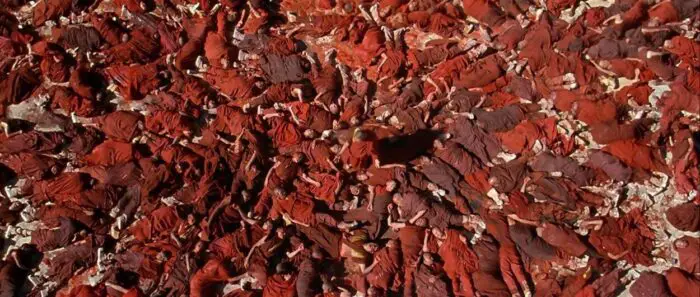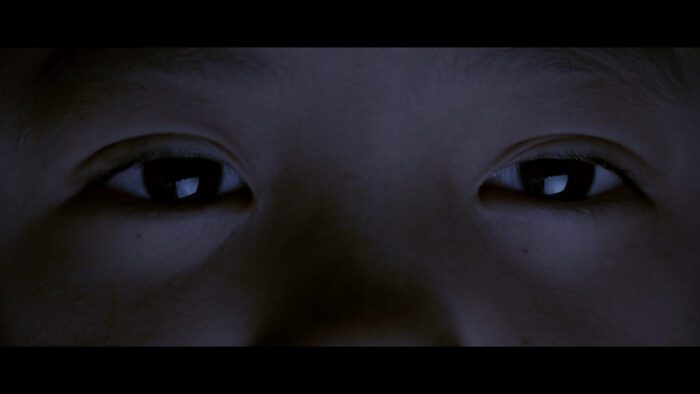Welcome to this column dedicated to my appreciation of physical media supplements called Feature Presentations. The goal of this column is not to say whether a film is good or bad and worth picking up or not; I would like to highlight the discs that go the extra mile and provide film fans with enough tasty tidbits to satisfy even the hungriest of cinephiles. Today’s article will focus on Kundun from the “Martin Scorsese Films of Faith” collection via Imprint Films.

I never have or will claim to be an expert in reviewing the technical specs of a physical media release. There are plenty of knowledgeable people in this realm of commenting on the audio and video aspects of a disc with better setups than I’ll ever own. This column, Feature Presentations, is a way of highlighting the supplemental material within a given disc. With all that out of the way, let’s get to the good stuff and dive into my review of this Blu-ray release of Kundun.
As a disclaimer of transparency for this episode of Feature Presentations, my review of Kundun comes from a review copy that Imprint Films provided for review. All thoughts and opinions are my own.
When I wrote my review on The Last Temptation of Christ, I mentioned that I always meant to check out the film but hadn’t. Kundun, on the other hand, is a film I saw many years back, and I had yet to revisit it since the late 1990s. My hazy recollections were that it was a meandering film that didn’t appeal to my younger sensibilities. Many years later, here in 2024, watching the movie again, the opportunity presented itself to reassess my initial mixed feelings on Kundun.
And while the film didn’t capture me quite like The Last Temptation of Christ, the story is lacking; other elements make the movie worth watching. Telling the tale of the search and early years of the 14th Dalai Lama, director Martin Scorsese and writer Melissa Mathison use the story as a jumping-off point for the audience to live an experience of sight and sound. Filled with sumptuous visuals and a wonderous score by Philip Glass, where the film falters in a compelling story and cohesion makes up for it in emotional resonance.
A newly recorded 2024 audio commentary with film scholar Michael Berry and author/film director Peter Markham kicks off disc one. Berry and Markham have a decent rapport with each other as they discuss behind the scenes aspects of the film and approach a large chunk of the commentary by approaching the movie with an open-endedness on the themes and choices made by Martin Scorsese. There are many times where the contributors fall into describing what is on screen; they do also offer insight into the filmmaking techniques the director applies to the feature, the usage of Philip Glass’ score and the choice to have all characters speak English. While I wish there was more analysis and less pointing out the on screen action, it does the job and gives the viewer enough information to make it a worthwhile listen.
The bulk of the film’s supplemental material lies on disc two, kicking off with “Kundun: The Soundscapes of Philip Glass,” which is an appreciation of the film’s score by Doug Adams of Film Score Monthly. Running over 11 minutes with occasional 2024 text quotes from Philip Glass, Adams discusses Glass and his ties to Buddhism, how Glass and Martin Scorsese collaborated over Kundun, and the disappointment at this being the only collaboration between the director and composer. While some engaging factoids are sprinkled throughout the runtime, I wish we could have gotten more out of this feature.
Next, film scholar Ian Christie continues his impressive feature appearances with another fascinating analysis of Kundun. Christie spends the 18-minute interview guiding us through how Martin Scorsese came to make the film, including spending a weekend with the Dalai Lama, Mathison, and Harrison Ford, the perils that came with making a film during turbulent times in Tibet, and the somewhat, though not unexpected, muted reception when the film released in 1997. I particularly enjoyed an aside of Christie recalling Scorsese’s appreciation toward editor Thelma Schoonmaker and her editing genius at finding ways to make sequences in the film that were not working initially and using her abilities to turn Kundun around and get it into presentable shape. It’s another terrific discussion, though I wish Christie spent more time delving into the troubled theatrical release with Disney, Tibet, and China.

“In Search of Kundun with Martin Scorsese is an 84-minute documentary written and directed by Michael Henry Wilson, shot around the time of the film’s production. Mixing on-set interviews with the cast and crew with fly-on-the-wall-type footage, “In Search of Kundun” does a fantastic job of putting the viewer in the Kundun set with Martin Scorsese and the production team. Scorsese discusses how he became aware of Tibetan culture and the Dalai Lama and the struggles of working with animals and young children; while some of the more fascinating comments come from the non-professional actors and their culture versus their Tibetan counterparts. As someone who loves to peek behind the filmmaking curtain, I could watch hours and hours of “In Search of Kundun,” but the 84 minutes you get are wonderous and a great compliment to the feature film.
“Compassion in Exile: The Story of the 14th Dalai Lama” is a 57-minute documentary focusing on the life of Tensin Gyatso, the 14th Dalai Lama. Not just content with an a-to-b story of telling the ascension of the as-of-2024, current Dalai Lama, the documentary delves into refugees looking to practice their Buddhist beliefs and the struggles against Chinese oppression. Occasionally, the documentary moves into light-hearted affair, such as the Dalai Lama and his love of fixing watches or a tourist discussing how a shirt featuring Sgt. Bilko was mistaken for the Dalai Lama. “Compassion in Exile” is most compelling when refugees discuss the horror stories Tibetans face on a daily basis. As someone not well-versed on the Dalai Lama and plight Tibetan Buddhists face, “Compassion in Exile” is a must-watch.
Imprint Films also includes a 33-minute interview with director Martin Scorsese, produced around Kundun‘s theatrical release. Produced as a piece of raw footage without cuts and the bluescreen background yet to be filled, this chat emphasizes how great of a storyteller Martin Scorsese is. As the filmmaker starts the discussion, he recounts a story of being in Berlin, transitioning into him explaining aloud about his “stream of consciousness,” even before the interview formally starts. Scorsese then gets into the film production, attempting to understand the ritual of Buddhism and the difficulties in making the film. I loved having this raw interview as it showcases how passionate the director is and, without cutting, we can understand his approach to film and the topics that matter most to him.
The next interview is another raw footage chat of 45 minutes conducted with composer Philip Glass. The musician discusses how he came to work on the film with Martin Scorsese, but as Glass is a practicing Buddhist; a lot of the piece is angled more toward the thematic elements of the film and Buddhist culture. One of the most striking elements of Kundun is the orchestral pieces, and getting inside the composer’s mind to understand the how and why, from a Buddhist perspective is one of the more fascinating pieces of supplemental material on the disc.
The last raw footage interviews conclude with a 38-minute interview with screenwriter Melissa Mathison. Mathison comes off as slightly nervous, which she mentions early on, and the interview comes off a bit awkward at times, even while dispensing many production details. She dishes on her writing process, being a visual writer, the Buddhist message, and utilizing real-life moments and situations to craft a screenplay that does the Dalal Lama justice. Mathison is a terrific writer, and even if her comments aren’t as fluid as Scorsese or measured as Glass, it is still wonderful to hear her thoughts.
Director Michael Henry Wilson, the filmmaker behind “In Search of Kundun,” sits for a 55-minute interview to discuss Kundun‘s production and how his documentary came together. Wilson talks about the reverence Scorsese had and shown by others during the shoot, the inclination of Scorsese looking behind the rituals of spirituality to feel the spirit of the film, and how he approaches a documentary and the pitfalls of preconceived notions. Wilson’s chat is another raw footage interview conducted after the fact, and while a bit dry, is packed with anecdotes about Scorsese, the set of Kundun, and the approach of a documentarian.
Rounding out the second disc, Imprint Films includes a 40-minute collection of vintage EPK interviews featuring Martin Scorsese, production and costume designer Dante Ferretti, and many of the cast and crew. This gathering of sound bites is more puff pieces than anything else and, compared to the other features on the disc, feels weightless. I would never say no to more physical media supplements, but after one watch, you’ll probably never revisit it.

And there you have it! Martin Scorsese’s 1997 biographical drama, Kundun, is a feast for the eyes and ears but didn’t resonate quite as much as The Last Temptation of Christ in the storytelling department. Nonetheless, Imprint Films closes out the second movie of their “Martin Scorsese Films of Faith” collection with another stellar package, complete with a solid 2024 audio commentary and a bevy of insightful, archival features.



